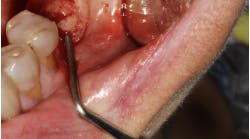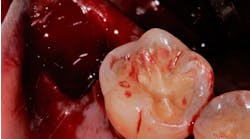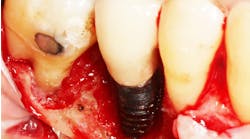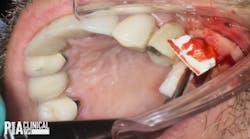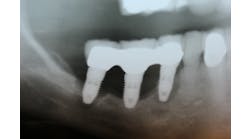Insufficient evidence to premedicate patients with joint replacements prior to dental procedures: Great, but what should I do in my office?
Recently the American Academy of Orthopaedic Surgeons (AAOS) in conjunction with the American Dental Association (ADA) released a statement stating that there was insufficient evidence to recommend the prophylactic use of antibiotics prior to dental procedures in patients with total joint replacements. These recommendations were based on “collaborative, evidence-based clinical practice guidelines” that focus on the orthopaedic/dental procedure infection link. According to Dr. Elliot Abt, a general dentist who was a committee member on the AAOS-ADA workgroup that reviewed published peer review literature, these guidelines “were based on clinical research on large groups of patients with hip or knee replacements, half with infected prosthetic joints.” The research showed that with or without premedication, the odds of developing an infection remained the same.
MORE ARTICLES BY DR. SCOTT FROUM ...
A tale of two humanities: Hurricane Sandy, the aftermath
I'll have a maxillary anterior implant to go; please hold the periodontal treatment
Case example of an anterior esthetic implant restoration with good surgical-restorative communications
Creating keratinized soft tissue to enhance the implant restoration
A protocol for follow-up visits post-implant placement
Review of the treatment protocols for peri-implantitis
How to set up an implant surgical room: a checklist
That being said, one needs to take a closer look at the summary of the recommendations prior to making a decision. The recommendation to discontinue the routine prescribing of prophylactic antibiotics in patients with total joint replacements prior to dental procedures received only a LIMITED recommendation. Limited means that “the quality of supporting evidence that exists is unconvincing, or that well-conducted studies show little clear advantage to one approach versus another.” Furthermore, “practitioners should be cautious in deciding whether to follow a recommendation classified as limited.”
After reviewing these recommendations set forth by the AAOS-ADA workgroup, Dr. Allan Kucine, chair of the Oral Surgery Department at SUNY Stony Brook stated, “It is incumbent upon us as clinicians to follow guidelines set forth by the ADA; however, these particular guidelines appear to be very vague, and I would suggest contacting the orthopaedic surgeon who placed the patient’s prosthesis to determine the need for antibiotic prophylaxis.”
Dr. Anthony Casino, an attending faculty member at SUNY Stony Brook Hospital in the Department of Oral Surgery agrees, stating, “The need for antibiotic prophylaxis in patients with prosthetic joints prior to dental procedures is a debate that has existed for over 20 years.” Dr. Casino points out that although the overall mean rate of infection of prosthetic joints is 2%, most of these infections are caused by Staphylococcus Aureus. The oral-associated bacteria — i.e., Streptococcus Viridans — has only been linked to these infections in a limited number of published cases. In addition, Dr. Casino suggests that most of the oral bacteremias affect well-perfused areas — i.e., the heart. Because prosthetic joints “are usually fibrously encapsulated, it would make sense that this would provide a barrier against oral-associated bacteremias.” With all that in mind, Dr. Casino states that he would leave the decision to premedicate up to the orthopaedic surgeon who placed the joints because of the serious devastation that can take place if the prosthesis becomes infected.
This author recently conducted a mini-sample poll speaking with five different orthopaedic surgeons at the Hospital for Special Surgery in New York City, N.Y. After reviewing the new recommendations by the AAOS-ADA workgroup, the question was asked: “Would you recommend antibiotic prophylaxis for your patients undergoing dental procedures?” All of the surgeons were in agreement: YES!
Author bio
Scott Froum, DDS, is a periodontist and co-editor of Surgical-Restorative Resource™ e-newsletter. He is a clinical associate professor at the New York University Dental School in the Department of Periodontology and Implantology. He is in private practice in New York City. You may contact him through his website at www.drscottfroum.com.

